Marriott International: Talent Management Impact Research Report
VerifiedAdded on 2023/01/10
|7
|1686
|48
Report
AI Summary
This research project examines the impact of talent management on employee performance, focusing on Marriott International. The report outlines the aims and objectives, research questions, and provides a comprehensive literature review on talent management practices. The research design employs a quantitative approach using a questionnaire for data collection, with a sampling strategy involving 30 respondents who have used services from Marriott International. The project's timeline spans seven weeks, during which data will be collected and analyzed to determine the effects of talent management on employee motivation, productivity, and overall organizational success. The conclusion highlights the significance of talent management for enhancing employee performance and achieving organizational goals within the hospitality industry. The report also includes a detailed list of references from books, journals, and online sources to support the findings.
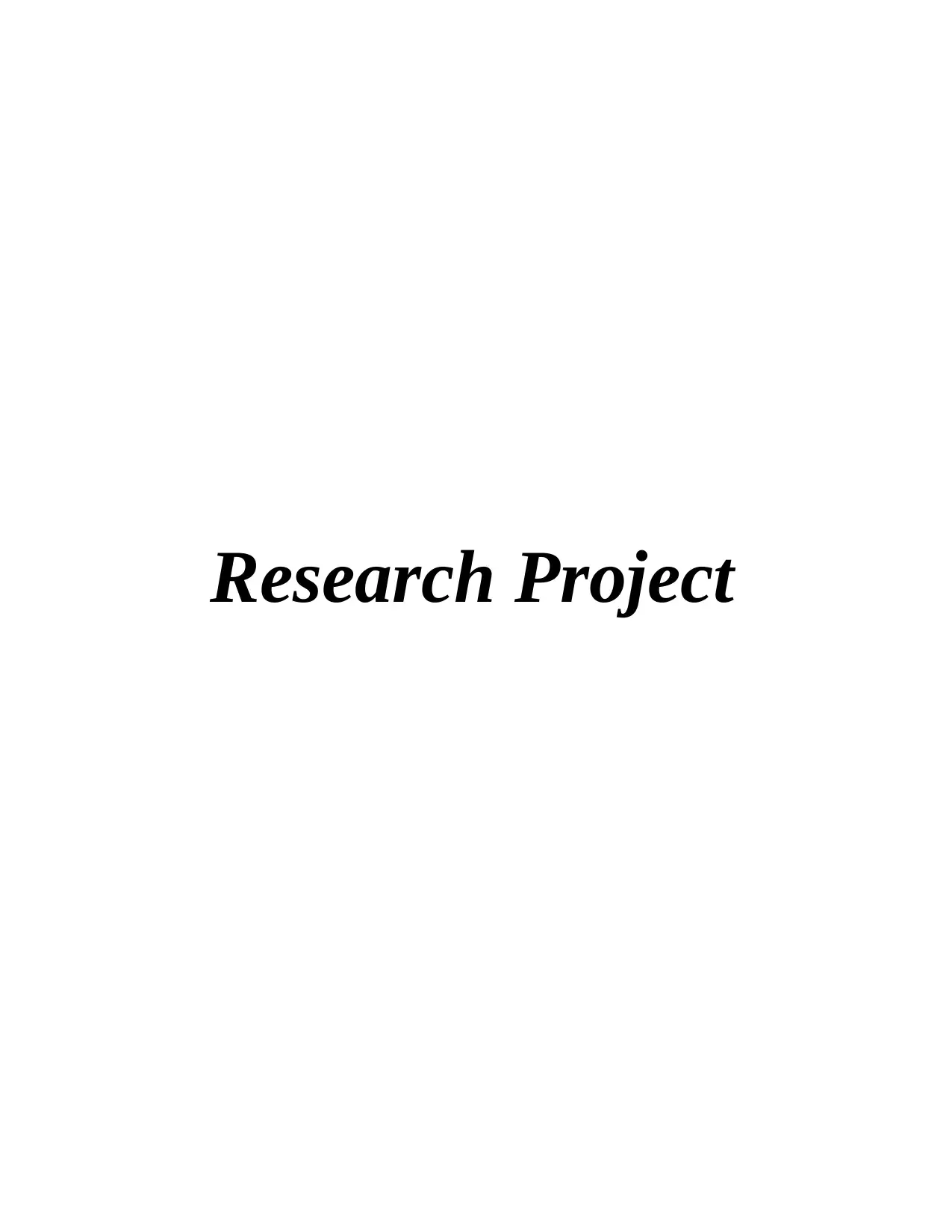
Research Project
Paraphrase This Document
Need a fresh take? Get an instant paraphrase of this document with our AI Paraphraser
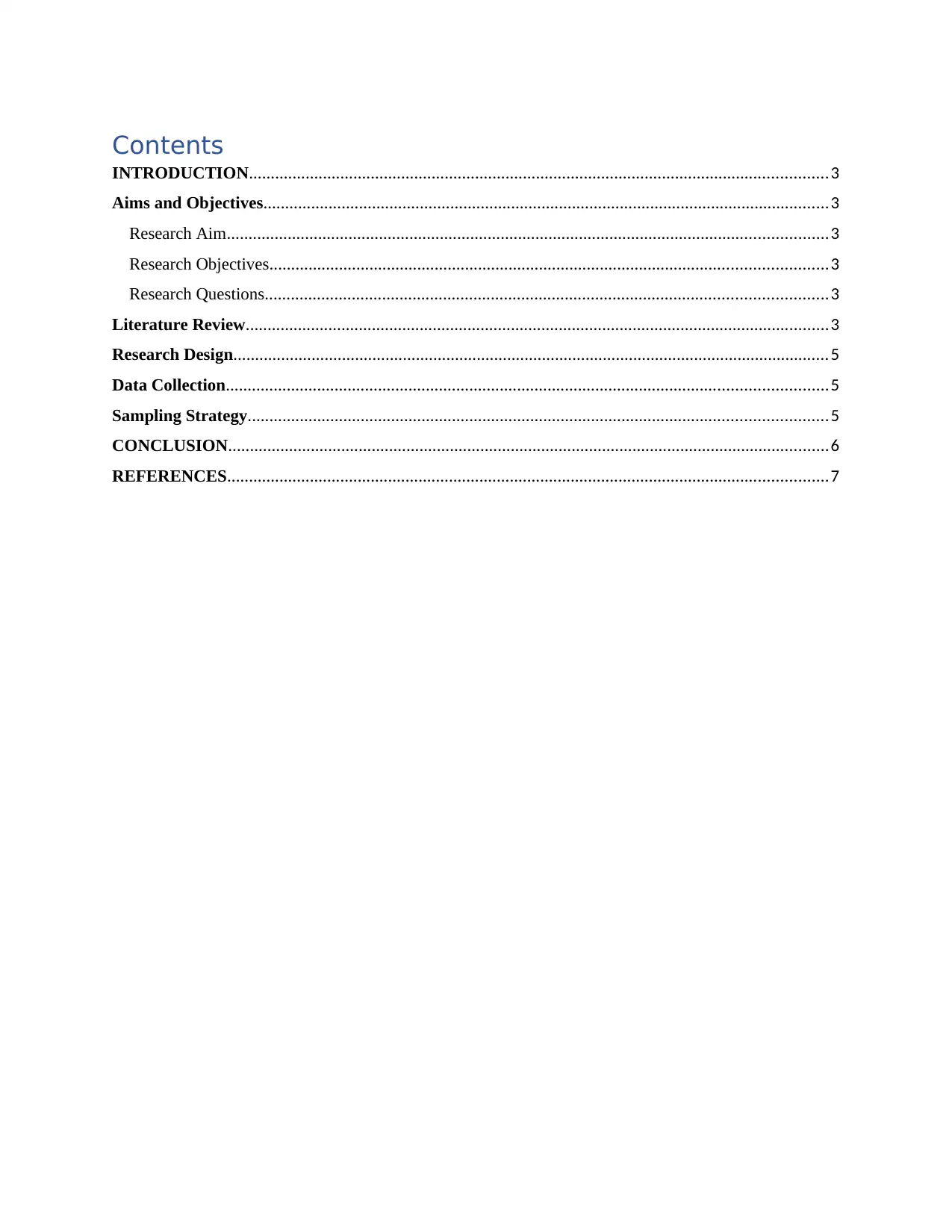
Contents
INTRODUCTION.....................................................................................................................................3
Aims and Objectives..................................................................................................................................3
Research Aim..........................................................................................................................................3
Research Objectives................................................................................................................................3
Research Questions.................................................................................................................................3
Literature Review......................................................................................................................................3
Research Design.........................................................................................................................................5
Data Collection..........................................................................................................................................5
Sampling Strategy.....................................................................................................................................5
CONCLUSION..........................................................................................................................................6
REFERENCES..........................................................................................................................................7
INTRODUCTION.....................................................................................................................................3
Aims and Objectives..................................................................................................................................3
Research Aim..........................................................................................................................................3
Research Objectives................................................................................................................................3
Research Questions.................................................................................................................................3
Literature Review......................................................................................................................................3
Research Design.........................................................................................................................................5
Data Collection..........................................................................................................................................5
Sampling Strategy.....................................................................................................................................5
CONCLUSION..........................................................................................................................................6
REFERENCES..........................................................................................................................................7
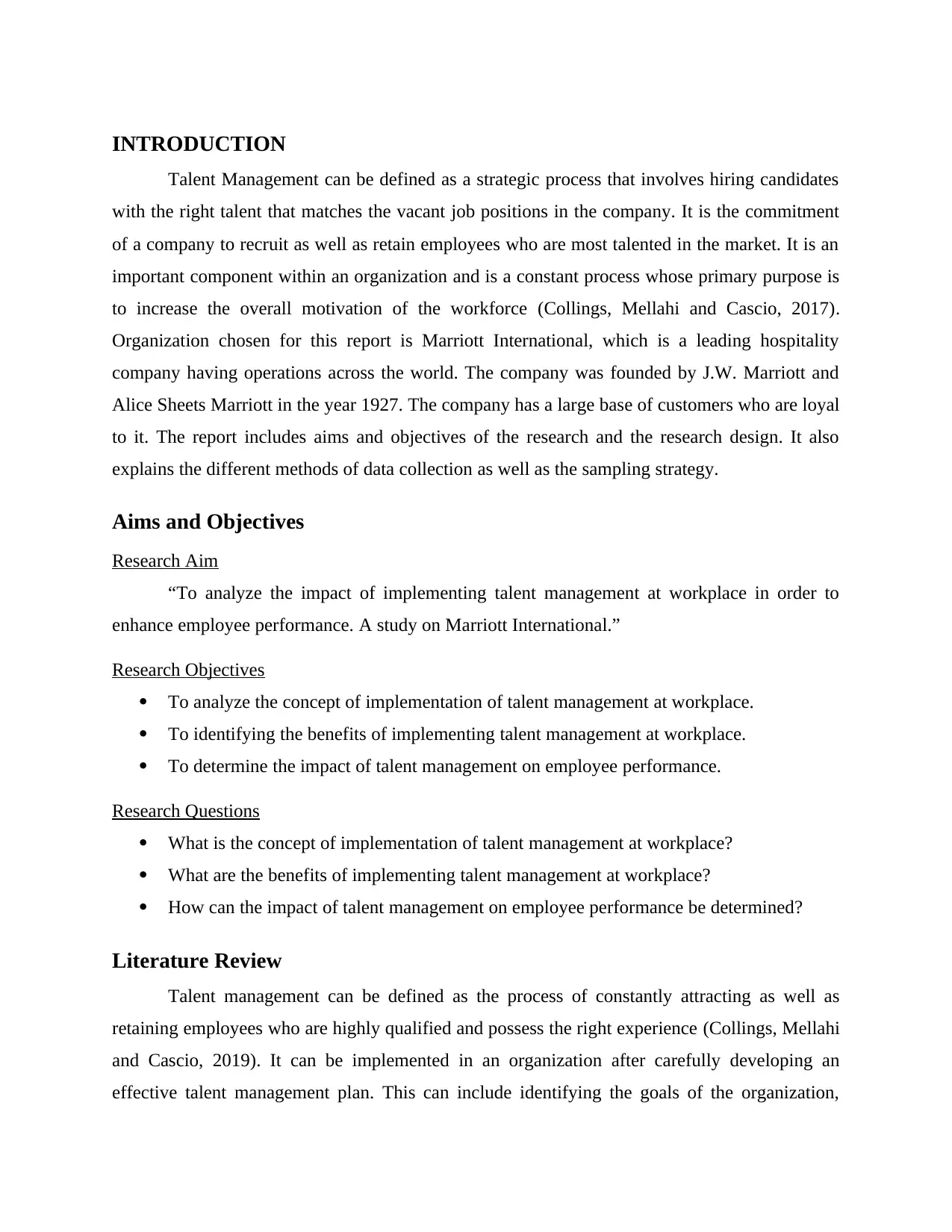
INTRODUCTION
Talent Management can be defined as a strategic process that involves hiring candidates
with the right talent that matches the vacant job positions in the company. It is the commitment
of a company to recruit as well as retain employees who are most talented in the market. It is an
important component within an organization and is a constant process whose primary purpose is
to increase the overall motivation of the workforce (Collings, Mellahi and Cascio, 2017).
Organization chosen for this report is Marriott International, which is a leading hospitality
company having operations across the world. The company was founded by J.W. Marriott and
Alice Sheets Marriott in the year 1927. The company has a large base of customers who are loyal
to it. The report includes aims and objectives of the research and the research design. It also
explains the different methods of data collection as well as the sampling strategy.
Aims and Objectives
Research Aim
“To analyze the impact of implementing talent management at workplace in order to
enhance employee performance. A study on Marriott International.”
Research Objectives
To analyze the concept of implementation of talent management at workplace.
To identifying the benefits of implementing talent management at workplace.
To determine the impact of talent management on employee performance.
Research Questions
What is the concept of implementation of talent management at workplace?
What are the benefits of implementing talent management at workplace?
How can the impact of talent management on employee performance be determined?
Literature Review
Talent management can be defined as the process of constantly attracting as well as
retaining employees who are highly qualified and possess the right experience (Collings, Mellahi
and Cascio, 2019). It can be implemented in an organization after carefully developing an
effective talent management plan. This can include identifying the goals of the organization,
Talent Management can be defined as a strategic process that involves hiring candidates
with the right talent that matches the vacant job positions in the company. It is the commitment
of a company to recruit as well as retain employees who are most talented in the market. It is an
important component within an organization and is a constant process whose primary purpose is
to increase the overall motivation of the workforce (Collings, Mellahi and Cascio, 2017).
Organization chosen for this report is Marriott International, which is a leading hospitality
company having operations across the world. The company was founded by J.W. Marriott and
Alice Sheets Marriott in the year 1927. The company has a large base of customers who are loyal
to it. The report includes aims and objectives of the research and the research design. It also
explains the different methods of data collection as well as the sampling strategy.
Aims and Objectives
Research Aim
“To analyze the impact of implementing talent management at workplace in order to
enhance employee performance. A study on Marriott International.”
Research Objectives
To analyze the concept of implementation of talent management at workplace.
To identifying the benefits of implementing talent management at workplace.
To determine the impact of talent management on employee performance.
Research Questions
What is the concept of implementation of talent management at workplace?
What are the benefits of implementing talent management at workplace?
How can the impact of talent management on employee performance be determined?
Literature Review
Talent management can be defined as the process of constantly attracting as well as
retaining employees who are highly qualified and possess the right experience (Collings, Mellahi
and Cascio, 2019). It can be implemented in an organization after carefully developing an
effective talent management plan. This can include identifying the goals of the organization,
⊘ This is a preview!⊘
Do you want full access?
Subscribe today to unlock all pages.

Trusted by 1+ million students worldwide
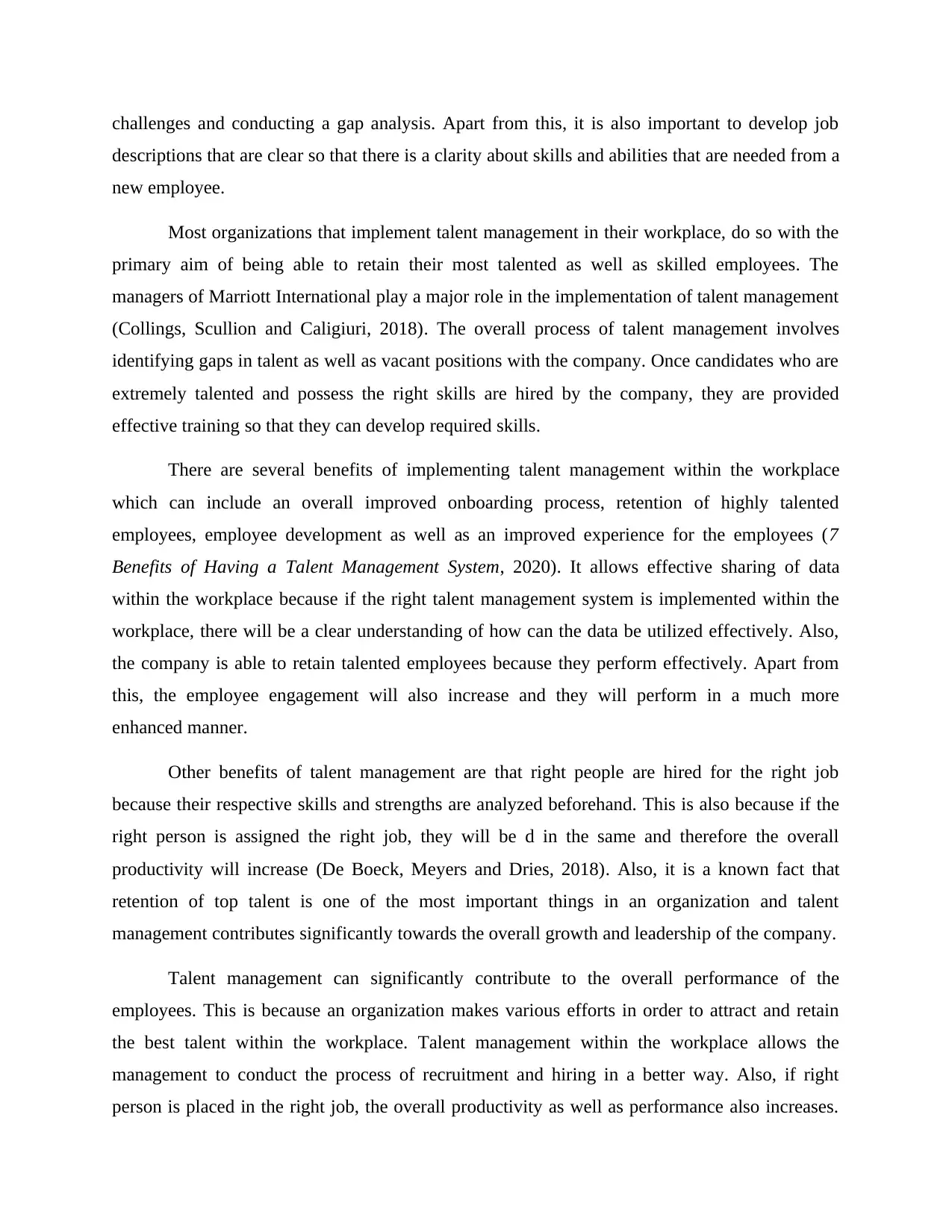
challenges and conducting a gap analysis. Apart from this, it is also important to develop job
descriptions that are clear so that there is a clarity about skills and abilities that are needed from a
new employee.
Most organizations that implement talent management in their workplace, do so with the
primary aim of being able to retain their most talented as well as skilled employees. The
managers of Marriott International play a major role in the implementation of talent management
(Collings, Scullion and Caligiuri, 2018). The overall process of talent management involves
identifying gaps in talent as well as vacant positions with the company. Once candidates who are
extremely talented and possess the right skills are hired by the company, they are provided
effective training so that they can develop required skills.
There are several benefits of implementing talent management within the workplace
which can include an overall improved onboarding process, retention of highly talented
employees, employee development as well as an improved experience for the employees (7
Benefits of Having a Talent Management System, 2020). It allows effective sharing of data
within the workplace because if the right talent management system is implemented within the
workplace, there will be a clear understanding of how can the data be utilized effectively. Also,
the company is able to retain talented employees because they perform effectively. Apart from
this, the employee engagement will also increase and they will perform in a much more
enhanced manner.
Other benefits of talent management are that right people are hired for the right job
because their respective skills and strengths are analyzed beforehand. This is also because if the
right person is assigned the right job, they will be d in the same and therefore the overall
productivity will increase (De Boeck, Meyers and Dries, 2018). Also, it is a known fact that
retention of top talent is one of the most important things in an organization and talent
management contributes significantly towards the overall growth and leadership of the company.
Talent management can significantly contribute to the overall performance of the
employees. This is because an organization makes various efforts in order to attract and retain
the best talent within the workplace. Talent management within the workplace allows the
management to conduct the process of recruitment and hiring in a better way. Also, if right
person is placed in the right job, the overall productivity as well as performance also increases.
descriptions that are clear so that there is a clarity about skills and abilities that are needed from a
new employee.
Most organizations that implement talent management in their workplace, do so with the
primary aim of being able to retain their most talented as well as skilled employees. The
managers of Marriott International play a major role in the implementation of talent management
(Collings, Scullion and Caligiuri, 2018). The overall process of talent management involves
identifying gaps in talent as well as vacant positions with the company. Once candidates who are
extremely talented and possess the right skills are hired by the company, they are provided
effective training so that they can develop required skills.
There are several benefits of implementing talent management within the workplace
which can include an overall improved onboarding process, retention of highly talented
employees, employee development as well as an improved experience for the employees (7
Benefits of Having a Talent Management System, 2020). It allows effective sharing of data
within the workplace because if the right talent management system is implemented within the
workplace, there will be a clear understanding of how can the data be utilized effectively. Also,
the company is able to retain talented employees because they perform effectively. Apart from
this, the employee engagement will also increase and they will perform in a much more
enhanced manner.
Other benefits of talent management are that right people are hired for the right job
because their respective skills and strengths are analyzed beforehand. This is also because if the
right person is assigned the right job, they will be d in the same and therefore the overall
productivity will increase (De Boeck, Meyers and Dries, 2018). Also, it is a known fact that
retention of top talent is one of the most important things in an organization and talent
management contributes significantly towards the overall growth and leadership of the company.
Talent management can significantly contribute to the overall performance of the
employees. This is because an organization makes various efforts in order to attract and retain
the best talent within the workplace. Talent management within the workplace allows the
management to conduct the process of recruitment and hiring in a better way. Also, if right
person is placed in the right job, the overall productivity as well as performance also increases.
Paraphrase This Document
Need a fresh take? Get an instant paraphrase of this document with our AI Paraphraser
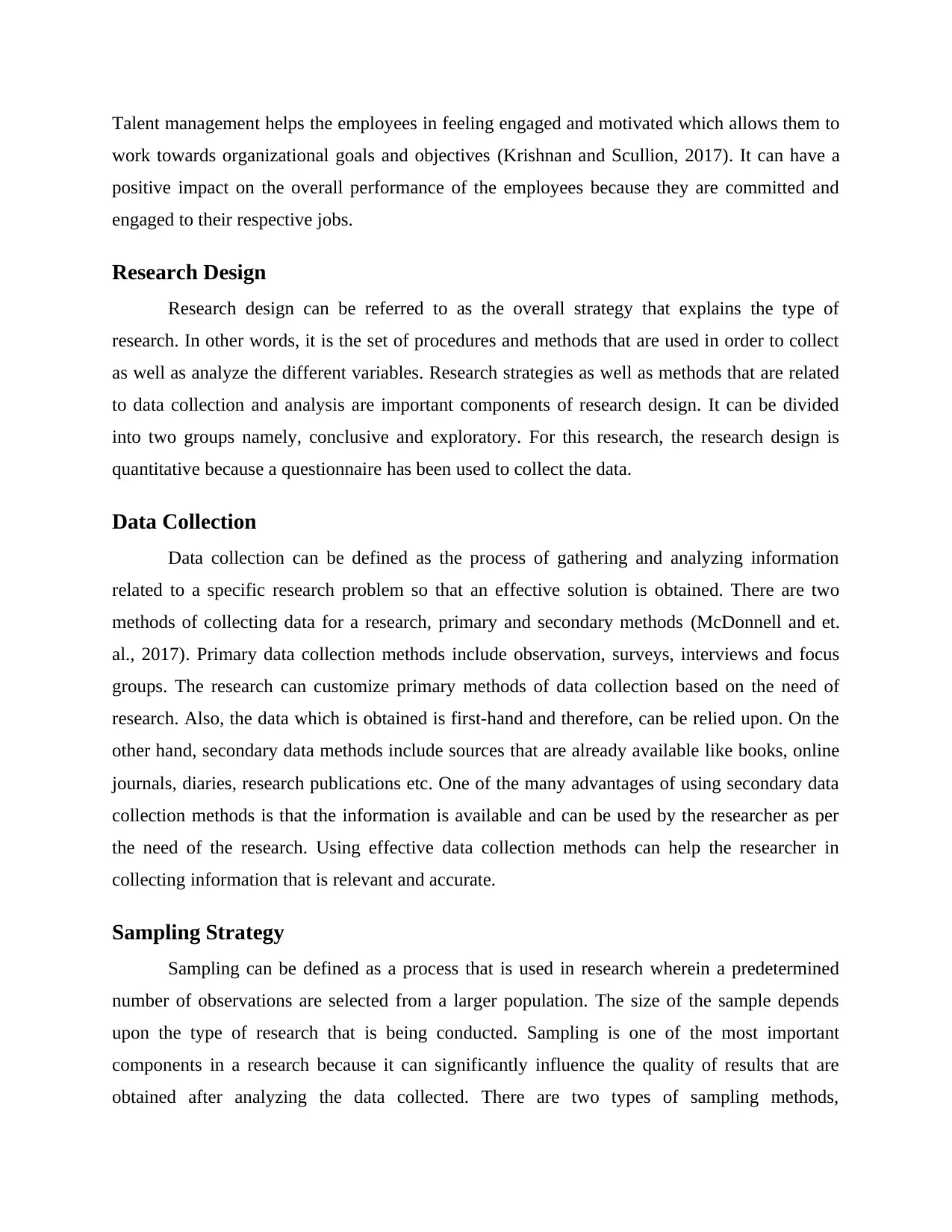
Talent management helps the employees in feeling engaged and motivated which allows them to
work towards organizational goals and objectives (Krishnan and Scullion, 2017). It can have a
positive impact on the overall performance of the employees because they are committed and
engaged to their respective jobs.
Research Design
Research design can be referred to as the overall strategy that explains the type of
research. In other words, it is the set of procedures and methods that are used in order to collect
as well as analyze the different variables. Research strategies as well as methods that are related
to data collection and analysis are important components of research design. It can be divided
into two groups namely, conclusive and exploratory. For this research, the research design is
quantitative because a questionnaire has been used to collect the data.
Data Collection
Data collection can be defined as the process of gathering and analyzing information
related to a specific research problem so that an effective solution is obtained. There are two
methods of collecting data for a research, primary and secondary methods (McDonnell and et.
al., 2017). Primary data collection methods include observation, surveys, interviews and focus
groups. The research can customize primary methods of data collection based on the need of
research. Also, the data which is obtained is first-hand and therefore, can be relied upon. On the
other hand, secondary data methods include sources that are already available like books, online
journals, diaries, research publications etc. One of the many advantages of using secondary data
collection methods is that the information is available and can be used by the researcher as per
the need of the research. Using effective data collection methods can help the researcher in
collecting information that is relevant and accurate.
Sampling Strategy
Sampling can be defined as a process that is used in research wherein a predetermined
number of observations are selected from a larger population. The size of the sample depends
upon the type of research that is being conducted. Sampling is one of the most important
components in a research because it can significantly influence the quality of results that are
obtained after analyzing the data collected. There are two types of sampling methods,
work towards organizational goals and objectives (Krishnan and Scullion, 2017). It can have a
positive impact on the overall performance of the employees because they are committed and
engaged to their respective jobs.
Research Design
Research design can be referred to as the overall strategy that explains the type of
research. In other words, it is the set of procedures and methods that are used in order to collect
as well as analyze the different variables. Research strategies as well as methods that are related
to data collection and analysis are important components of research design. It can be divided
into two groups namely, conclusive and exploratory. For this research, the research design is
quantitative because a questionnaire has been used to collect the data.
Data Collection
Data collection can be defined as the process of gathering and analyzing information
related to a specific research problem so that an effective solution is obtained. There are two
methods of collecting data for a research, primary and secondary methods (McDonnell and et.
al., 2017). Primary data collection methods include observation, surveys, interviews and focus
groups. The research can customize primary methods of data collection based on the need of
research. Also, the data which is obtained is first-hand and therefore, can be relied upon. On the
other hand, secondary data methods include sources that are already available like books, online
journals, diaries, research publications etc. One of the many advantages of using secondary data
collection methods is that the information is available and can be used by the researcher as per
the need of the research. Using effective data collection methods can help the researcher in
collecting information that is relevant and accurate.
Sampling Strategy
Sampling can be defined as a process that is used in research wherein a predetermined
number of observations are selected from a larger population. The size of the sample depends
upon the type of research that is being conducted. Sampling is one of the most important
components in a research because it can significantly influence the quality of results that are
obtained after analyzing the data collected. There are two types of sampling methods,
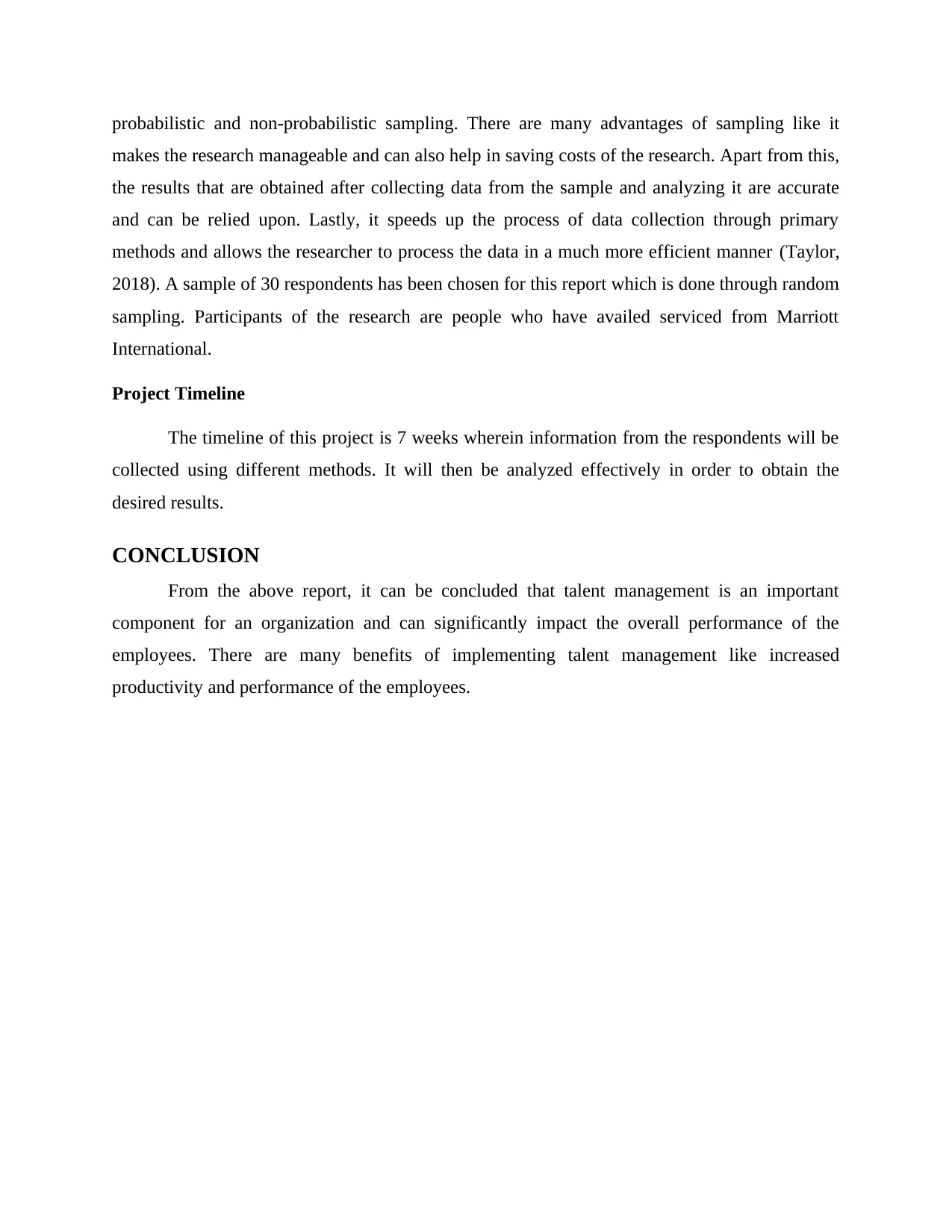
probabilistic and non-probabilistic sampling. There are many advantages of sampling like it
makes the research manageable and can also help in saving costs of the research. Apart from this,
the results that are obtained after collecting data from the sample and analyzing it are accurate
and can be relied upon. Lastly, it speeds up the process of data collection through primary
methods and allows the researcher to process the data in a much more efficient manner (Taylor,
2018). A sample of 30 respondents has been chosen for this report which is done through random
sampling. Participants of the research are people who have availed serviced from Marriott
International.
Project Timeline
The timeline of this project is 7 weeks wherein information from the respondents will be
collected using different methods. It will then be analyzed effectively in order to obtain the
desired results.
CONCLUSION
From the above report, it can be concluded that talent management is an important
component for an organization and can significantly impact the overall performance of the
employees. There are many benefits of implementing talent management like increased
productivity and performance of the employees.
makes the research manageable and can also help in saving costs of the research. Apart from this,
the results that are obtained after collecting data from the sample and analyzing it are accurate
and can be relied upon. Lastly, it speeds up the process of data collection through primary
methods and allows the researcher to process the data in a much more efficient manner (Taylor,
2018). A sample of 30 respondents has been chosen for this report which is done through random
sampling. Participants of the research are people who have availed serviced from Marriott
International.
Project Timeline
The timeline of this project is 7 weeks wherein information from the respondents will be
collected using different methods. It will then be analyzed effectively in order to obtain the
desired results.
CONCLUSION
From the above report, it can be concluded that talent management is an important
component for an organization and can significantly impact the overall performance of the
employees. There are many benefits of implementing talent management like increased
productivity and performance of the employees.
⊘ This is a preview!⊘
Do you want full access?
Subscribe today to unlock all pages.

Trusted by 1+ million students worldwide
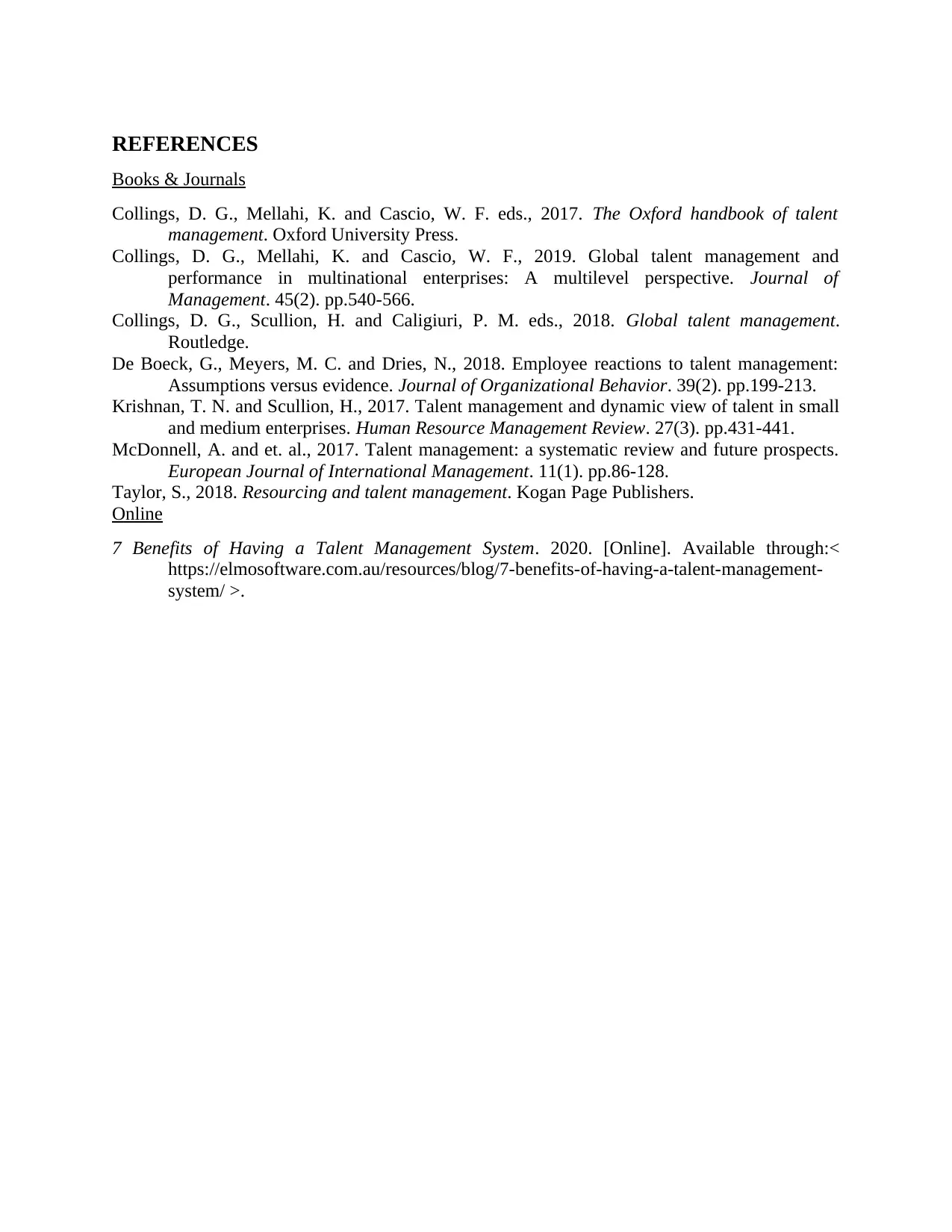
REFERENCES
Books & Journals
Collings, D. G., Mellahi, K. and Cascio, W. F. eds., 2017. The Oxford handbook of talent
management. Oxford University Press.
Collings, D. G., Mellahi, K. and Cascio, W. F., 2019. Global talent management and
performance in multinational enterprises: A multilevel perspective. Journal of
Management. 45(2). pp.540-566.
Collings, D. G., Scullion, H. and Caligiuri, P. M. eds., 2018. Global talent management.
Routledge.
De Boeck, G., Meyers, M. C. and Dries, N., 2018. Employee reactions to talent management:
Assumptions versus evidence. Journal of Organizational Behavior. 39(2). pp.199-213.
Krishnan, T. N. and Scullion, H., 2017. Talent management and dynamic view of talent in small
and medium enterprises. Human Resource Management Review. 27(3). pp.431-441.
McDonnell, A. and et. al., 2017. Talent management: a systematic review and future prospects.
European Journal of International Management. 11(1). pp.86-128.
Taylor, S., 2018. Resourcing and talent management. Kogan Page Publishers.
Online
7 Benefits of Having a Talent Management System. 2020. [Online]. Available through:<
https://elmosoftware.com.au/resources/blog/7-benefits-of-having-a-talent-management-
system/ >.
Books & Journals
Collings, D. G., Mellahi, K. and Cascio, W. F. eds., 2017. The Oxford handbook of talent
management. Oxford University Press.
Collings, D. G., Mellahi, K. and Cascio, W. F., 2019. Global talent management and
performance in multinational enterprises: A multilevel perspective. Journal of
Management. 45(2). pp.540-566.
Collings, D. G., Scullion, H. and Caligiuri, P. M. eds., 2018. Global talent management.
Routledge.
De Boeck, G., Meyers, M. C. and Dries, N., 2018. Employee reactions to talent management:
Assumptions versus evidence. Journal of Organizational Behavior. 39(2). pp.199-213.
Krishnan, T. N. and Scullion, H., 2017. Talent management and dynamic view of talent in small
and medium enterprises. Human Resource Management Review. 27(3). pp.431-441.
McDonnell, A. and et. al., 2017. Talent management: a systematic review and future prospects.
European Journal of International Management. 11(1). pp.86-128.
Taylor, S., 2018. Resourcing and talent management. Kogan Page Publishers.
Online
7 Benefits of Having a Talent Management System. 2020. [Online]. Available through:<
https://elmosoftware.com.au/resources/blog/7-benefits-of-having-a-talent-management-
system/ >.
1 out of 7
Related Documents
Your All-in-One AI-Powered Toolkit for Academic Success.
+13062052269
info@desklib.com
Available 24*7 on WhatsApp / Email
![[object Object]](/_next/static/media/star-bottom.7253800d.svg)
Unlock your academic potential
Copyright © 2020–2026 A2Z Services. All Rights Reserved. Developed and managed by ZUCOL.





